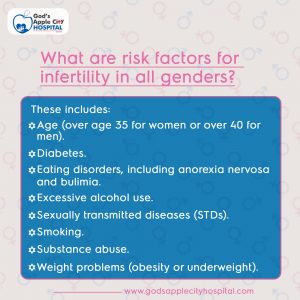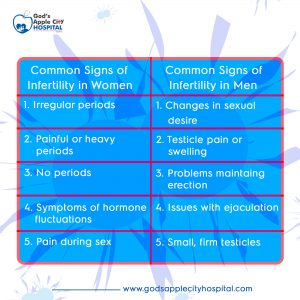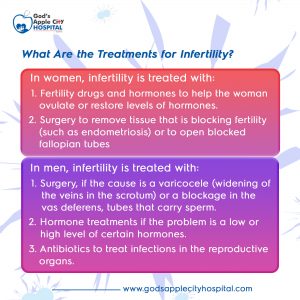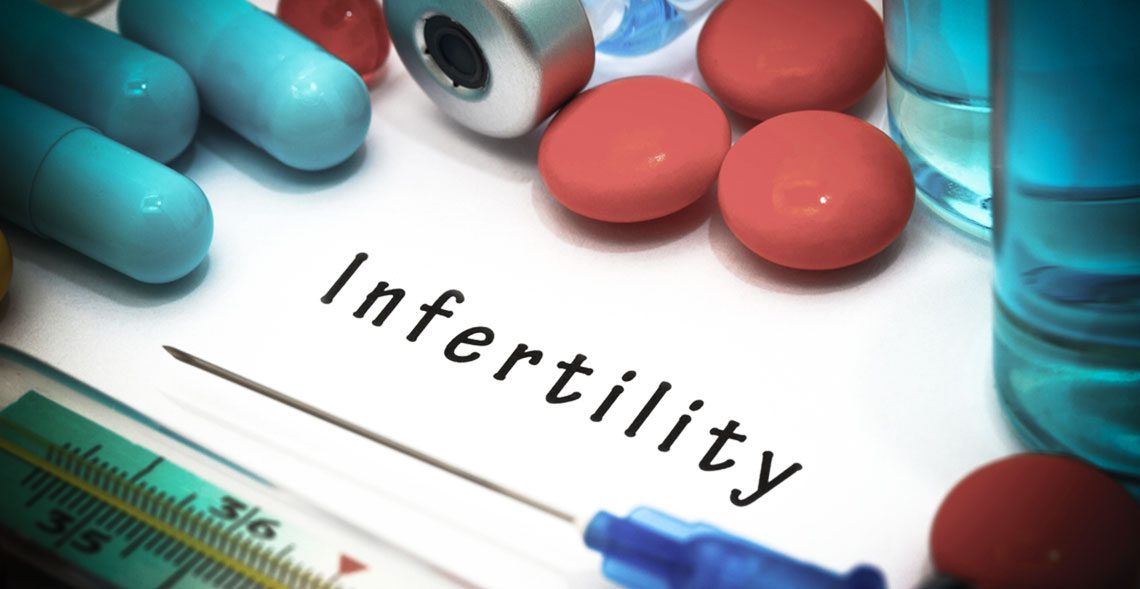Infertility is defined as not being able to get pregnant despite having frequent, unprotected sex for at least a year for most couples.
Infertility may result from an issue with either you or your partner, or a combination of factors that prevent pregnancy. Fortunately, there are many safe and effective therapies that significantly improve your chances of getting pregnant.

Risk Factors for infertility
- Age: The ability to conceive starts to fall around the age of 32 years.
- Smoking: Smoking significantly increases the risk of infertility in both men and women, and it may undermine the effects of fertility treatment. Smoking during pregnancy increases the chance of pregnancy loss. Passive smoking has also been linked to lower fertility.
- Alcohol: Any amount of alcohol consumption can affect the chances of conceiving.
- Being obese or overweight: This can increase the risk of infertility in women as well as men.
- Eating disorders: If an eating disorder leads to serious weight loss, fertility problems may arise.
- Diet: A lack of folic acid, iron, zinc, and vitamin B-12 can affect fertility. Women who are at risk, including those on a vegan diet, should ask the doctor about supplements.
- Exercise: Both too much and too little exercise can lead to fertility problems.
- Sexually transmitted infections (STIs): Chlamydia can damage the fallopian tubes in a woman and cause inflammation in a man’s scrotum. Some other STIs may also cause infertility.
- Exposure to some chemicals: Some pesticides, herbicides, metals, such as lead, and solvents have been linked to fertility problems in both men and women. A mouse study has suggested that ingredients in some household detergents may reduce fertility.
- Mental stress: This may affect female ovulation and male sperm production and can lead to reduced sexual activity.
Signs of Potential Infertility in Women
In women, changes in the menstrual cycle and ovulation may be a symptom of a disease related to infertility. Symptoms include:
- Abnormal periods. Bleeding is heavier or lighter than usual.
- Irregular periods. The number of days in between each period varies each month.
- No periods. You have never had a period, or periods suddenly stop.
- Painful periods. Back pain, pelvic pain, and cramping may happen.
Sometimes, female infertility is related to a hormone problem. In this case, symptoms can also include:
- Skin changes, including more acne
- Changes in sex drive and desire
- Dark hair growth on the lips, chest, and chin
- Loss of hair or thinning hair
- Weight gain
Other symptoms of disorders that may lead to infertility include:
- Milky white discharge from nipples unrelated to breastfeeding
- Pain during sex
Many other things can be related to infertility in women, and their symptoms vary.
What Causes Fertility Problems in Women?
The main reason for infertility in women is that you don’t ovulate, which means your ovary doesn’t release an egg. A condition called polycystic ovary syndrome is the main cause.
- Problems with your fallopian tubes, which carry eggs from the ovary to the uterus. Sometimes your tubes can get blocked by scar tissue from an infection or from a condition called endometriosis.
- Smoking can lead to fertility problems in women.
- Being overweight or underweight can also play a role.
- If an egg does make its way through your fallopian tubes, many things can stop it from implanting in your uterus.
- Cervical mucus can damage sperm or slow their progress.
In women, fertility drops with age, especially after age 35. Getting pregnant after age 45 is rare.
Signs of Potential Infertility in Men
Infertility symptoms in men can be vague. They may go unnoticed until a man tries to have a baby.
Symptoms depend on what is causing the infertility. They can include:
- Changes in hair growth
- Changes in sexual desire
- Pain, lump, or swelling in the testicles
- Problems with erections and ejaculation
- Small, firm testicles
What Causes Fertility Problems in Men?
The most common cause for infertility in men is a problem with sperm, including:
- Low sperm count, which means you have too few or no sperm in your semen.
- Your sperm don’t move as well as they should, which is called low sperm motility.
- You have abnormally formed sperm.
- Your sperm ducts are blocked.
Another common problem is a temporary drop in the amount of sperm you make. This might happen when your testicles get injured. For instance, it could be that your testicles were too hot for too long. Or it might be you were in contact with chemicals or took drugs that affect the way you make sperm.
If you drink alcohol or smoke, your sperm count can go down.
Also, men ages 40 and older have lower fertility.

What are the Treatments for infertility
Infertility treatment depends on the cause, your age, how long you’ve been infertile and personal preferences. Because infertility is a complex disorder, treatment involves significant financial, physical, psychological and time commitments.
Treatments can either attempt to restore fertility through medication or surgery, or help you get pregnant with sophisticated techniques.
Medications to restore fertility
Medications that regulate or stimulate ovulation are known as fertility drugs. Fertility drugs are the main treatment for women who are infertile due to ovulation disorders.
Fertility drugs generally work like natural hormones — follicle-stimulating hormone (FSH) and luteinizing hormone (LH) — to trigger ovulation. They’re also used in women who ovulate to try to stimulate a better egg or an extra egg or eggs.
Surgery to restore fertility
Several surgical procedures can correct problems or otherwise improve female fertility. However, surgical treatments for fertility are rare these days due to the success of other treatments. They include:
- Laparoscopic or hysteroscopic surgery. Surgery might involve correcting problems with the uterine anatomy, removing endometrial polyps and some types of fibroids that misshape the uterine cavity, or removing pelvic or uterine adhesions.
- Tubal surgeries. If your fallopian tubes are blocked or filled with fluid, your doctor might recommend laparoscopic surgery to remove adhesions, dilate a tube or create a new tubal opening. This surgery is rare, as pregnancy rates are usually better with in vitro fertilization (IVF). For this surgery, removal of your tubes or blocking the tubes close to the uterus can improve your chances of pregnancy with IVF.

Reproductive assistance
The most commonly used methods of reproductive assistance include:
- Intrauterine insemination (IUI). During IUI, millions of healthy sperm are placed inside the uterus around the time of ovulation.
- Assisted reproductive technology. This involves retrieving mature eggs, fertilizing them with sperm in a dish in a lab, then transferring the embryos into the uterus after fertilization. IVF is the most effective assisted reproductive technology. An IVF cycle takes several weeks and requires frequent blood tests and daily hormone injections.
Prevention
Some types of infertility aren’t preventable. But several strategies may increase your chances of pregnancy.
Couples
Have regular intercourse several times around the time of ovulation for the highest pregnancy rate. Intercourse beginning at least five days before and until a day after ovulation improves your chances of getting pregnant. Ovulation usually occurs in the middle of the cycle halfway between menstrual periods for most women with menstrual cycles about 28 days apart.
Men
Although most types of infertility aren’t preventable in men, these strategies may help:
- Avoid drug and tobacco use and drinking too much alcohol, which may contribute to male infertility.
- Avoid high temperatures found in hot tubs and hot baths, as they can temporarily affect sperm production and motility.
- Avoid exposure to industrial or environmental toxins, which can affect sperm production.
- Limit medications that may impact fertility, both prescription and nonprescription drugs. Talk with your doctor about any medications you take regularly, but don’t stop taking prescription medications without medical advice.
- Exercise moderately. Regular exercise may improve sperm quality and increase the chances for achieving a pregnancy.
Women
For women, a number of strategies may increase the chances of becoming pregnant:
- Quit smoking. Tobacco has many negative effects on fertility, not to mention your general health and the health of a fetus. If you smoke and are considering pregnancy, quit now.
- Avoid alcohol and street drugs. These substances may impair your ability to conceive and have a healthy pregnancy. Don’t drink alcohol or use recreational drugs, such as marijuana, if you’re trying to get pregnant.
- Limit caffeine. Women trying to get pregnant may want to limit caffeine intake. Ask your doctor for guidance on the safe use of caffeine.
- Exercise moderately. Regular exercise is important, but exercising so intensely that your periods are infrequent or absent can affect fertility.
- Avoid weight extremes. Being overweight or underweight can affect your hormone production and cause infertility.

